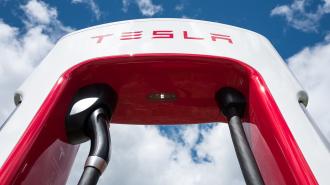Tesla Superchargers will soon work with Ford and GM EVs
Two of America’s largest automakers have announced partnerships with Tesla to allow their customers to charge their EVs using Tesla’s Superchargers.
Ford and GM owners will have access to the fast-charging stations beginning in early 2024, the automakers said. The move marks another step in Detroit’s momentum toward electrifying their offerings — and a possible panacea to one of people’s biggest hang ups when making the move away from gasoline: fears of a juiceless ride.
“Widespread access to fast-charging is absolutely vital to our growth as an EV brand,” Ford president and CEO Jim Farley said. The move coincides with plans to increase the production of Mustang Mach-Es and F-150 Lightnings, as well as new EV models coming in 2025.
Ford and GM owners will have access to the fast-charging stations beginning in early 2024.
The agreement will add thousands of chargers to the company’s lineup, while potentially shifting the industry toward a standard for charging.
“This collaboration is a key part of our strategy and an important next step in quickly expanding access to fast chargers for our customers,” GM chair and CEO Mary Barra said. “Not only will it help make the transition to electric vehicles more seamless for our customers, but it could help move the industry toward a single North American charging standard.”
Breaking the ICE: Traditional internal combustion engines work by burning fuel, which has the unfortunate knock-on effect of releasing carbon dioxide and pollutants into the air. All told, transportation’s impact on the carbon footprint is huge; roughly 29% of US emissions come from the transportation sector, making it the number one contributor, even ahead of electricity.
Mass adoption of electric vehicles would go a long way in helping to control emissions and inch the world towards its climate goals. But many drivers are currently reluctant to make the switch; people often namecheck cost and charging concerns as a primary reason they’re sticking with gas.
Tesla teamup: Both Ford and GM have their own charging infrastructure, the BlueOval Charge and Ultium Charge 360 Networks. BlueOval already has 84,000 chargers, of which 10,000 are fast-chargers, while GM drivers can currently use 134,000 chargers to top off their rides.
Joining up with Tesla will instantly add 12,000 new chargers to the networks — Superchargers, at that, capable of putting 200 miles worth of power into a battery in 15 minutes. The Superchargers are not only fast but are also “much more reliable than most of the fast chargers that are out there,” according to NPR automotive journalist Camila Domonoske.
The agreement will add thousands of chargers to the company’s lineup, while potentially shifting the industry toward a new standard for charging.
While the vehicles will initially need adapters to use Tesla’s chargers, both Ford and GM will build in Supercharger-ready ports beginning in 2025.
That could be key to the long term impact of the deal, Domonoske said. EVs in the US currently use two different systems: Tesla’s NACS, and everyone else’s CCS, which Domonoske reported is less reliable. Moving their models onto NACS may nudge that format closer to the industry standard. Think Blu-ray’s victory over HD DVD — which is credited, at least in part, to being used for the PlayStation 3.
“Tesla has led the industry in creating a large, reliable and efficient charging system and we are pleased to be able to join forces in a way that benefits customers and overall EV adoption,” Marin Gjaja, chief customer officer for the Ford Model e, said.
“The Tesla Supercharger network has excellent reliability and the NACS plug is smaller and lighter. Overall, this provides a superior experience for customers.”
We’d love to hear from you! If you have a comment about this article or if you have a tip for a future Freethink story, please email us at tips@freethink.com.
